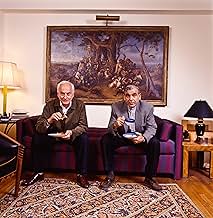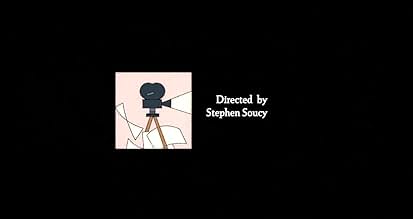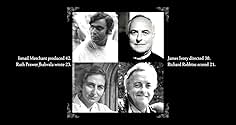Acompanha a história da parceria com a Merchant Ivory, apresentando entrevistas com James Ivory e colaboradores próximos detalhando e celebrando suas experiências de fazer parte da empresa.Acompanha a história da parceria com a Merchant Ivory, apresentando entrevistas com James Ivory e colaboradores próximos detalhando e celebrando suas experiências de fazer parte da empresa.Acompanha a história da parceria com a Merchant Ivory, apresentando entrevistas com James Ivory e colaboradores próximos detalhando e celebrando suas experiências de fazer parte da empresa.
- Direção
- Roteiristas
- Artistas
- Prêmios
- 2 indicações no total
- Direção
- Roteiristas
- Elenco e equipe completos
- Produção, bilheteria e muito mais no IMDbPro
Avaliações em destaque
I feel a bit silly. I've heard of Merchant Ivory films. I've a notion of what they are, in short, period dramas. I had no clue they were films made by Ismail Merchant and James Ivory. An ampersand would have really helped. I had no idea those were two surnames. Anyway, this is their story. Of the independent production house and the films it created. Another point I'd missed is that it wasn't just Merchant and Ivory at the helm. As producer and director I guess they steal the limelight, but there was screenwriter Ruth Prawer Jhabvala and composer Richard Robbins too. I guess that might've been too much of a mouthful for the masthead. I'm also shocked to clock how recently they worked. The 80s sure, but well into the 90s and beyond, which is where a lot of the present day talking heads come from, with Helena Bonham Carter, Emma Thompson, Rupert Graves, Hugh Grant... you'll spot the theme. British. Very British, even if this tries to deny that a little. It's a fascinating story, low budget productions made to look a million dollars on screen, through sheer dogged determination. Volatile characters pushing through everyday boundaries. Creating tight knit groups on set with DIY Productions. We learn of 60s Indian film origins that gave them their start and the secret love affair between Jim & Ismail. In fact there's a lot of secret or not so relationships that weave through the Merchant Ivory story. The 80s is where the story really gathers pace. "The Merchant Ivory style was fully formed. Beautiful music. Worldly sensibility. Lush settings and complex characters" Stephen Soucy our director narrates. That's a perfect summary really. Ismail, no longer with us, sounds like quite a character. Wheeling and dealing, a smoke and mirrors approach to producing. James, who prefers Jim, still with us talks openly about being gay, how it was never an issue. He understood that certain people in their lives wouldn't approve, but keeping things private, all was fine. He's calm, polite, pleasant, his quiet charm drifts effortlessly from the screen. He's someone you'd want sit down and talk with. He's someone you'd want to make films with. It's made clear just how influential Ruth was too, she's a fascinating subject in her own right. Multicultural, an outsider, able to see beyond the restrictions of the source material they worked with, to open up unforeseen possibilities in stories like Howard's End that hauled in the awards. The detail of this doc is as deep as the films they made. From costume design, scriptwriters, novelists that inspire screenwriters, actors, editors, hair and make up, casting. I don't think I've ever seen so many contributors in a documentary. The best thing about docs like this is the films it introduces you too. I now have. A Room With a View, Maurice, Howard's End, The Remains of the Day to enjoy. This is a wonderful retrospective of a beautifully eccentric and gifted group of people and I feel well schooled.
Greetings again from the darkness. "A Merchant Ivory film" became a colloquialism when discussing certain films from the mid-1980's and continuing for about twenty years. Of course, they weren't all actual Merchant Ivory films ... though many tried to be. Documentarian Stephen Soucy has delivered quite a tribute to the filmmakers and the two men. Although from the beginning, Soucy posits this as a four-headed troupe, not two-headed.
The opening statistics show, between 1961 and 2007, Ismail Merchant produced 42 films, James Ivory directed 30 films, Ruth Prawer Jhabvala wrote 23 films, and composer Richard Robbins scored 21 films. With so many Oscar nominations for his films, it's interesting to note that producer Merchant never took the gold statue. It should also be noted that Ivory is the only surviving member of the foursome. Merchant died in 2005. Robbins died in 2012. Ruth died in 2013. It's 96-year-old James Ivory who is still active today, and even sits for an interview for the film.
Soucy divides the film into six chapters, but the film is so well structured, the chapter headings aren't even needed to help us stay on track. We hear how Merchant and Ivory first met, and early on Soucy includes interviews from actors such as Helena Bonham Carter, Hugh Grant, Emma Thompson, a prickly Vanessa Redgrave, Rupert Graves, Sam Waterston, and Simon Callow to offer insight into the challenging projects. Actors rave about the script while relaying the difficulties in working with such low and tight budgets. Merchant was constantly cutting costs while simultaneously working to raise money during productions.
Much of the insight revolves around the divergent personalities of Merchant and Ivory. Their relationship was volatile both on set and off, professionally and personally. Being "secretly" gay in New York during the 1960's would be challenging enough, and we then learn that Merchant was a charming rascal (sometimes con man), while Ivory was a meticulous craftsman. If not for Ivory's professionalism and Merchant's cooking, the sets may have been even more explosive.
As movie goers, we aren't privy to that extraneous stuff. Instead, we see the scrumptious sets and stunning costumes complementing rich stories and superb acting. So much of what Soucy presents here is new to us as film lovers. Additionally, it's wonderful to learn more about Oscar winning writer Ruth Prawer Jhabvala, who excelled at adapting the works of EM Forster for the big screen: A ROOM WITH A VIEW (1985), MAURICE (1987), and HOWARD's END (1992). And yes, she wrote the screenplay for THE REMAINS OF THE DAY (1993), which won no Oscars going up against the magnificent SCHINDLER'S LIST. Her daughter Ava is a contributor here.
Soucy tells us there were 15 films before A ROOM WITH A VIEW, which changed everything for the filmmakers and partners. It's truly fascinating to see clips from their early films and hear the stories about how those projects came together. There was, of course, criticism to go with the accolades, as their movies were referred to as the "Laura Ashley" school of filmmaking. And frequent costume designers (and multi-Oscar winners) Jenny Beavan and John Bright add that in addition to the budgetary concerns, the expedited timeframes and staff shortages brought more strain. Personal drama is brought to light, especially as it pertains to composer Richard Robbins, and his relationships with both Merchant and Helena Bonham Carter. The walls of that country estate could surely tell some tales.
After Merchant's death, it appeared that THE CITY OF YOUR FINAL DESTINATION (2009) would likely be Ivory's final film project. Instead, he won an Oscar for adapting the screenplay (from Andre Aciman's novel) for CALL ME BY YOUR NAME (2017), and has continued to write and direct. Ivory's memoir is quoted here. The chronological look at their films is interesting enough, yet it's the behind-the-scenes insight and personal details that set this apart from many documentary tributes. Even as it concludes, in our minds we hear the voice of Merchant, "Shoot, Jim! Shoot! Shoot!"
Opens in select theaters August 30, and expanding on September 6, 2024.
The opening statistics show, between 1961 and 2007, Ismail Merchant produced 42 films, James Ivory directed 30 films, Ruth Prawer Jhabvala wrote 23 films, and composer Richard Robbins scored 21 films. With so many Oscar nominations for his films, it's interesting to note that producer Merchant never took the gold statue. It should also be noted that Ivory is the only surviving member of the foursome. Merchant died in 2005. Robbins died in 2012. Ruth died in 2013. It's 96-year-old James Ivory who is still active today, and even sits for an interview for the film.
Soucy divides the film into six chapters, but the film is so well structured, the chapter headings aren't even needed to help us stay on track. We hear how Merchant and Ivory first met, and early on Soucy includes interviews from actors such as Helena Bonham Carter, Hugh Grant, Emma Thompson, a prickly Vanessa Redgrave, Rupert Graves, Sam Waterston, and Simon Callow to offer insight into the challenging projects. Actors rave about the script while relaying the difficulties in working with such low and tight budgets. Merchant was constantly cutting costs while simultaneously working to raise money during productions.
Much of the insight revolves around the divergent personalities of Merchant and Ivory. Their relationship was volatile both on set and off, professionally and personally. Being "secretly" gay in New York during the 1960's would be challenging enough, and we then learn that Merchant was a charming rascal (sometimes con man), while Ivory was a meticulous craftsman. If not for Ivory's professionalism and Merchant's cooking, the sets may have been even more explosive.
As movie goers, we aren't privy to that extraneous stuff. Instead, we see the scrumptious sets and stunning costumes complementing rich stories and superb acting. So much of what Soucy presents here is new to us as film lovers. Additionally, it's wonderful to learn more about Oscar winning writer Ruth Prawer Jhabvala, who excelled at adapting the works of EM Forster for the big screen: A ROOM WITH A VIEW (1985), MAURICE (1987), and HOWARD's END (1992). And yes, she wrote the screenplay for THE REMAINS OF THE DAY (1993), which won no Oscars going up against the magnificent SCHINDLER'S LIST. Her daughter Ava is a contributor here.
Soucy tells us there were 15 films before A ROOM WITH A VIEW, which changed everything for the filmmakers and partners. It's truly fascinating to see clips from their early films and hear the stories about how those projects came together. There was, of course, criticism to go with the accolades, as their movies were referred to as the "Laura Ashley" school of filmmaking. And frequent costume designers (and multi-Oscar winners) Jenny Beavan and John Bright add that in addition to the budgetary concerns, the expedited timeframes and staff shortages brought more strain. Personal drama is brought to light, especially as it pertains to composer Richard Robbins, and his relationships with both Merchant and Helena Bonham Carter. The walls of that country estate could surely tell some tales.
After Merchant's death, it appeared that THE CITY OF YOUR FINAL DESTINATION (2009) would likely be Ivory's final film project. Instead, he won an Oscar for adapting the screenplay (from Andre Aciman's novel) for CALL ME BY YOUR NAME (2017), and has continued to write and direct. Ivory's memoir is quoted here. The chronological look at their films is interesting enough, yet it's the behind-the-scenes insight and personal details that set this apart from many documentary tributes. Even as it concludes, in our minds we hear the voice of Merchant, "Shoot, Jim! Shoot! Shoot!"
Opens in select theaters August 30, and expanding on September 6, 2024.
A 2024 documentary about one of the most successful director/producer teams (James Ivory & Ishmail Merchant) in film history. Following an extensive interview w/Ivory (the last surviving member of the team which also included writer Ruth Prawer Jhabvala & composer Richard Robbins) elucidates to the audience on the fractious methodology on how they got their films made (Merchant always pulling out Hail Mary's whenever the budgets tended to get shaky) which other than dyed in the wool BBC concerns, Merchant Ivory efforts were always admired & vaulted for their expert book adaptations & classy productions. What most people didn't know, me included, was that Ivory & Merchant were lovers for many years which they kept to themselves which gives a rewatch of their films an added level of complexity once you realized what was happening behind the scenes to get these projects to the screen. W/various talking head interviews which include Oscar nominee Helena Bonham Carter, Oscar winner Emma Thompson (who won for Howard's End), Oscar winner Vanessa Redgrave, Hugh Grant, Simon Callow et al detailing the charm & professionalism of their associations also makes you wish the team was still around but Ivory, who finally won a Best Adapted screenplay Oscar for Call Me By My Name a few years ago, still hopes he has another one in him, let's concur.
This impressive work of documentary filmmaking offers fans a richer understanding of what went into the making of the Merchant Ivory masterpieces-the challenges, the dedication, the artistry. It offers a behind-the-scenes look at the human effort that shaped the films so many of us have admired for decades. The documentary feels like a natural companion to those timeless films, and will certainly resonate with many audiences, new and old, just as their movies have.
Soucy is a brilliant director, producer, and writer who has crafted an important and insightful documentary. The film not only brings to life the incredible legacy of Merchant/Ivory, but it also offers a deep exploration of the creative process that shaped some of cinema's most beloved and enduring works. Beyond being entertaining and engaging, the documentary stands as a meaningful contribution to film history and scholarship, shedding new light on the dynamics behind the iconic films and partnership of Merchant and Ivory.
Soucy is a brilliant director, producer, and writer who has crafted an important and insightful documentary. The film not only brings to life the incredible legacy of Merchant/Ivory, but it also offers a deep exploration of the creative process that shaped some of cinema's most beloved and enduring works. Beyond being entertaining and engaging, the documentary stands as a meaningful contribution to film history and scholarship, shedding new light on the dynamics behind the iconic films and partnership of Merchant and Ivory.
Before I start writing about this documentary on the James Ivory-Ismail Merchant partnership that encompassed dozens of highly acclaimed films with magnificent scripts and award-winning performances and great scores, it is incumbent on me to tell you that I don't like their films. They start at a high pitch, continue at a high pitch, and end there. There's no relief, no sense that I can relax for a moment and review. Yes, the performances may be among the best ever seen, but as so often happens, it's professional actors speaking about things I can't appreciate. They are undoubtedly true, but they are not something that I can appreciate. And so I leave every one of their films feeling exhausted and stupid. A great film, a great work of art, reveals more to the diligent audience the more it is examined. But that first viewing needs to be rewarding. And I never feel rewarded by a Merchant-Ivory film. I feel scolded, belittled and in no mood to put in the effort to appreciate whatever it is they wish me to experience.
This does not mean that I don't accept they made magnificent movies. It means I can accept that, admire their dedication, and say "Not for me." This does not mean that I am fit to look at only Adam Sandler comedies and Superhero movies. I hope. I admire their work without taking any pleasure in it.
Now that I've written that, you will, I hope, have a better idea of how to appraise my review of this movie. And I think it is a very good documentary, which points out the dedication of the two men to making good movies, calls out their frequent collaborators like screenwriter Ruth Prawer Jhabvala and composer Richard Robbins for their contributions, offers a view of the dynamics of their relationships, professional and personal. It does what a documentary of this sort is supposed to do, and does it very well. In a manner I can appreciate.
This does not mean that I don't accept they made magnificent movies. It means I can accept that, admire their dedication, and say "Not for me." This does not mean that I am fit to look at only Adam Sandler comedies and Superhero movies. I hope. I admire their work without taking any pleasure in it.
Now that I've written that, you will, I hope, have a better idea of how to appraise my review of this movie. And I think it is a very good documentary, which points out the dedication of the two men to making good movies, calls out their frequent collaborators like screenwriter Ruth Prawer Jhabvala and composer Richard Robbins for their contributions, offers a view of the dynamics of their relationships, professional and personal. It does what a documentary of this sort is supposed to do, and does it very well. In a manner I can appreciate.
Você sabia?
- ConexõesFeatures The Sword and the Flute (1959)
Principais escolhas
Faça login para avaliar e ver a lista de recomendações personalizadas
Detalhes
- Data de lançamento
- País de origem
- Central de atendimento oficial
- Idioma
- Também conhecido como
- 默詮艾佛利電影情緣
- Empresa de produção
- Consulte mais créditos da empresa na IMDbPro
Bilheteria
- Orçamento
- US$ 600.000 (estimativa)
- Faturamento bruto mundial
- US$ 18.671
- Tempo de duração1 hora 52 minutos
- Cor
Contribua para esta página
Sugerir uma alteração ou adicionar conteúdo ausente

Principal brecha
By what name was Merchant Ivory (2023) officially released in India in English?
Responda




































